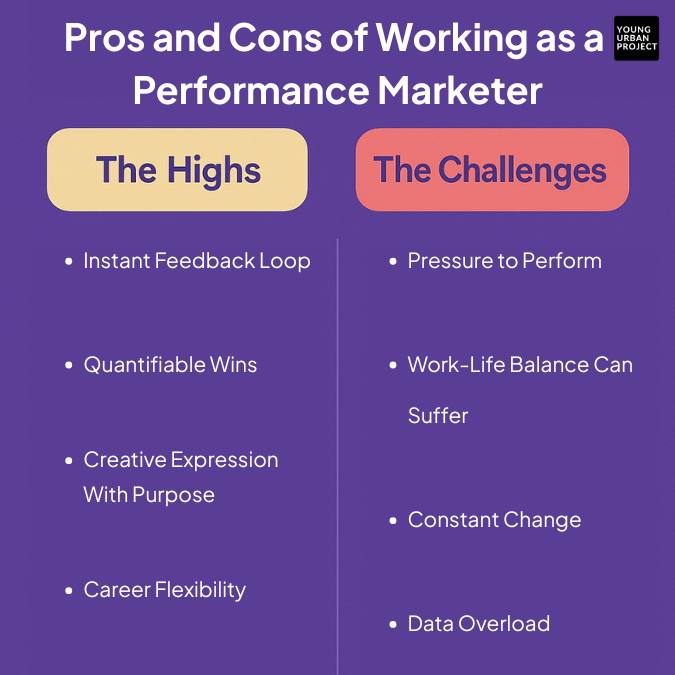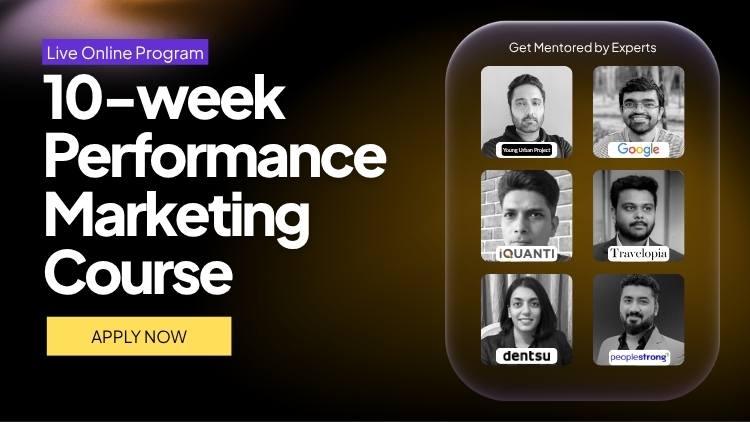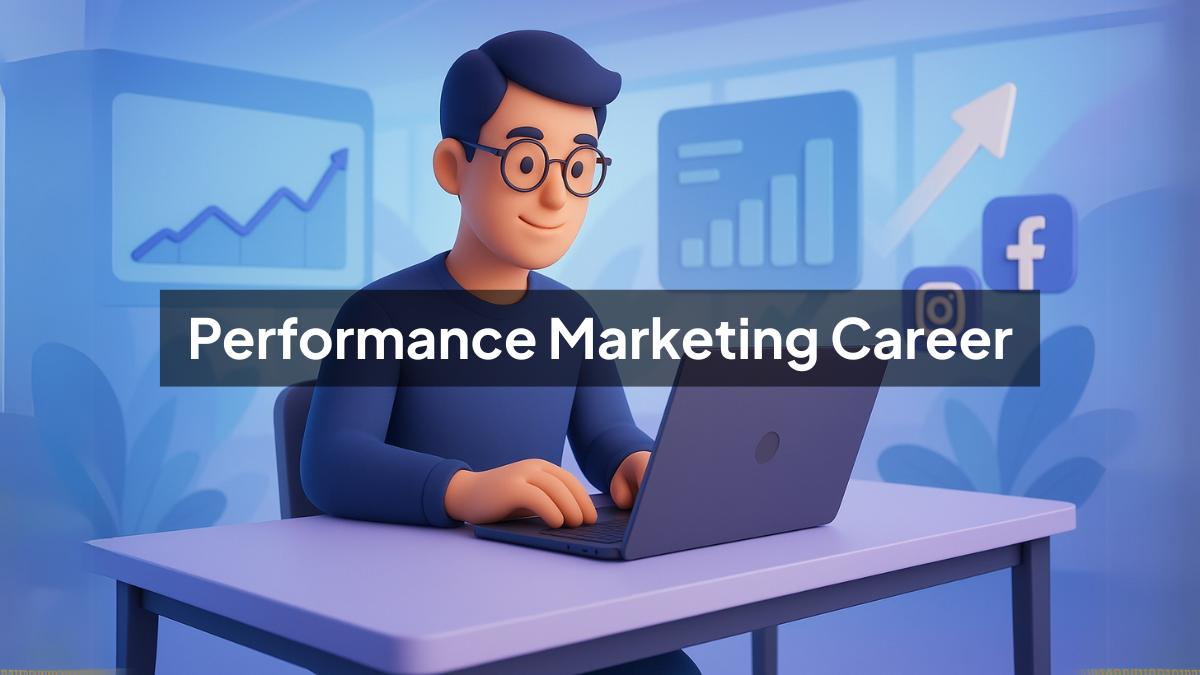Back in the early 2010s, when digital ads were still novel, anyone with basic Google Ads knowledge could run a few campaigns, get decent results, and call themselves a marketing expert.
Fast forward to 2025, and the game has changed.
Performance marketing is now a powerhouse within digital marketing – sitting at the intersection of creativity, data, psychology, and tech. Every startup, D2C brand, SaaS product, and even legacy business wants a performance marketer who can turn ad spend into revenue – predictably and profitably.
But as the industry has matured, so have its demands.
If you’re wondering like many others: is Performance Marketing a Good Career, this guide will give you the real answer, with no fluff.
We’ll unpack the rise of this discipline, who it’s really for, what the job feels like on a daily basis, where the industry is heading, and what skills will keep you competitive in the long run.
Table of Contents
What Actually is Performance Marketing?
To truly assess this career path, we have to get past the buzzwords and understand what performance marketing actually involves.
At its core, performance marketing is any marketing activity where the advertiser pays only for measurable results – not just for impressions or visibility. That result could be a click, a lead form submission, an app install, a sale, or a subscription.
In that sense, it’s completely outcome-driven. Unlike traditional branding campaigns where success is often fuzzy or long-term, performance marketing puts pressure on marketers to deliver short-term, trackable ROI.
Popular Performance Marketing channels include:
- Google Ads (Search, Display, Shopping, Performance Max)
- Meta Ads (Facebook, Instagram, Messenger)
- LinkedIn & TikTok Ads (especially in B2B and youth segments)
- Affiliate Marketing
- Email Marketing (with performance-centric goals like click-throughs and conversions)
- Influencer Campaigns (now often structured around CPA models)
It’s a mix of art and algorithm. You could be writing an ad headline in the morning, analyzing a 300-row Excel report after lunch, and setting up an A/B test for a landing page by evening.
But here’s what makes performance marketing unique – every decision you make has a number attached to it.
Why This Career Path is Booming in 2025
Let’s be real – every business wants marketing that “works.” And performance marketing, by its very nature, is built to work or die.
Here’s why demand is exploding:
1. The Great Shift to ROI Accountability
Thanks to tighter marketing budgets and increased boardroom scrutiny (especially post-2023 recession concerns), CMOs are being asked harder questions:
“What did we get from that campaign?”
“Why are we spending this much?”
“What’s our CAC compared to LTV?”
This shift in mindset has made performance marketers invaluable. Unlike brand marketers who focus on awareness, performance marketers deal with metrics the CFO actually cares about – revenue, acquisition cost, retention, return on ad spend (ROAS).
In many companies, they’re no longer just part of the marketing team – they’re now seen as growth partners. That’s one reason some performance marketers are also called “Growth Marketers“.
Also Read: Difference Between ROAS and Blended ROAS
2. Industry-Agnostic Demand
You don’t need to work at a unicorn startup to have a meaningful career in performance marketing. Businesses across industries rely on it:
- E-commerce brands live and die by their ROAS.
- SaaS companies use paid search and retargeting to convert free users.
- Real estate, fintech, healthtech, education – all thrive on lead generation.
- Even nonprofits and political campaigns use performance-style campaigns to drive awareness, sign-ups, or donations.
This cross-sector relevance makes performance marketing a resilient career, even during downturns.
3. Global Freelance & Remote Work Surge
The beauty of this field? You don’t need to be in an office. Most campaign tools are cloud-based, and freelancers or consultants often juggle clients from the US, UK, Dubai, Singapore – all from a home desk in Pune or Bangalore.
On platforms like Upwork or Toptal, experienced media buyers can earn $50–$150/hour if they can prove their track record.
Add to that the rise of performance marketing agencies, micro-agencies, and solopreneur growth consultants – and you’ve got a thriving independent economy.
What’s It Really Like to Work in Performance Marketing?

Let’s cut past the LinkedIn hype. Here’s a closer look at the lifestyle, culture, and day-to-day experience of working in the Performance Marketing field.
✅ The Highs
- Instant Feedback Loop
You run ads → monitor dashboards → tweak → repeat. The loop is fast, which means you learn and grow at lightning speed. - Quantifiable Wins
You can directly attribute revenue to your decisions. That’s satisfying. Especially if you’re someone who likes tangible impact. - Creative Expression With Purpose
You’re not just making ads look good. You’re making them convert. That balance of aesthetics and psychology is a thrilling challenge. - Career Flexibility
Want to go agency-side? In-house? Freelance? Run your own thing? Performance marketers can pick their path.
❌ The Challenges
- Pressure to Perform
Every campaign has a cost. If your ads flop, there’s no hiding. You’re held accountable for results – sometimes harshly. - Work-Life Balance Can Suffer
Launching and optimizing campaigns across time zones can mean working weekends or monitoring performance late into the night. - Constant Change
One week, your best campaign is flying. The next, an algorithm tweak tanks it. You need thick skin and sharp instincts. - Data Overload
Attribution is messy. Platforms underreport. Clients obsess over vanity metrics. You must separate signal from noise – daily.
Also read: Performance Marketing vs Paid Advertising
The Skills That Will Make or Break You in 2025
With AI tools automating routine tasks, human marketers need to evolve into strategic, adaptive thinkers.
Here’s what separates the pros from the average:
1. Advanced Data Literacy
Reading dashboards isn’t enough. You need to:
- Analyze customer journeys
- Attribute revenue correctly
- Create cohort reports
- Use tools like Looker Studio, GA4, and Mixpanel like a pro
2. Platform-Specific Deep Expertise
Surface-level Google Ads knowledge won’t cut it. You need to:
- Master Performance Max
- Optimize Meta Advantage+ campaigns
- Build retargeting loops across channels
3. Testing Mindset & CRO
You’re not just running ads – you’re optimizing systems. That includes:
- Running A/B tests on landing pages
- Improving UX
- Increasing checkout conversion rates
4. Strategic Thinking
How does paid traffic support the full funnel? How does it connect to email automation, content, LTV? Strategic minds win.
5. Client & Team Communication
Many marketers fail not due to lack of skill – but poor stakeholder management. Being able to present data as a story is key.
6. Compliance & Ethics
Privacy laws are tightening. You need to respect data boundaries while still driving performance. Understanding first-party data strategies and tools like Google Consent Mode v2 are now essential.

Enroll Now: AI-Powered Performance Marketing Course
How AI is Changing the Career Landscape
AI tools have made some aspects of performance marketing easier – but also more competitive.
Tools like:
- ChatGPT or Jasper for generating ad copy variations
- Motion & Pencil for AI-powered creative testing
- Madgicx, AdCreative.ai, and Triple Whale for optimization insights
- HeyGen + ElevenLabs for AI-Avatar Videos
- Dall-E or Midjourney for creating product ads
…are now standard in modern ad teams.
But here’s the twist: AI hasn’t replaced performance marketers – it has exposed the gap between tactical button-pushers and strategic thinkers.
In 2025, the best marketers aren’t those who just run ads. They’re those who understand how ads fit into larger business ecosystems – and can use AI to scale their thinking, not just automate tasks.
So, is Performance Marketing a Good Career in 2025?
Let’s answer this plainly.
👉 If you love fast-paced environments, thrive on pressure, and enjoy solving creative + analytical puzzles, then YES – performance marketing is one of the most exciting, lucrative, and resilient careers you can pursue.
But…
👉 If you’re allergic to numbers, uncomfortable with constant change, or want a chill, predictable workweek – then this might not be the path for you.
Final Thoughts: What You Should Do Next
If you’re already in digital marketing and want to level up into performance, the transition is totally doable – but it requires commitment. You’ll need to build strong fundamentals, get real campaign experience, and learn to think like a strategist.
If you’re brand new and considering this career, start by learning:
- Paid media fundamentals (Google & Meta)
- Funnel strategies and CRO
- Analytics tools
- AI-enhanced workflows

